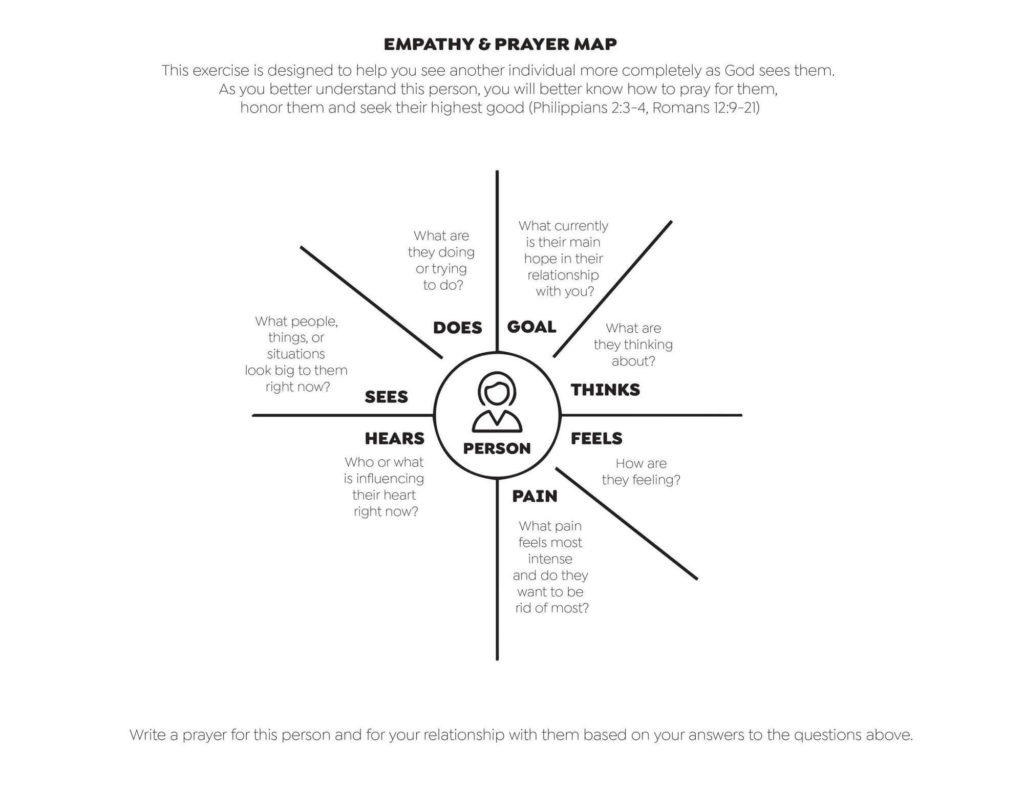With the holiday season arriving, it is a good time to take a step back and prepare for conversations that could be difficult. One simple way to prepare is to evaluate your listening skills.
Our ability to love absolutely depends on accurately understanding the people God puts in our lives (Prov 20:5). Before we can care for someone with wisdom, we must strive to see an individual as God sees them. But, as you may have experienced, there are many obstacles that can make this challenging. People can struggle in what and how they share, fixating on certain details and minimizing others. As listeners, we might tend to overanalyze, miss something important that was shared, or display some other personal weakness when it comes to hearing someone well.
However, once we can see someone as God sees them, we are in a better position to honor them, seek their highest good, and pray for them (Phil 2:3-4, Rom 12:9-21). Additionally, listening well equips us to help people see themselves with more accurate knowledge so they can pursue Christ with greater clarity and hope. In fact, this should be the foundational goal for all our relationships.
To help improve our listening skills, here is a series of questions to help us explore our blind spots when it comes to listening. As you go through these questions, answer them for yourself, but also discuss them with a good friend so that you can better see where God is calling you to grow in love through listening:
- Can you summarize the ideas someone shares with you with kindness and precision? Would they understand and appreciate your characterization?
- When you listen, are you thinking about what you want to say or how to build a deeper understanding of someone? Especially consider moments when someone is critical of you (or your church, hobbies, etc.). When do your listening priorities shift away from the goal of understanding someone and toward playing offense or defense in the conversation?
- How often do you interrupt someone when they speak? What do you think drives this impulse? Did your communication skills develop in an environment where interrupting one another or talking over each other was the norm? Are there certain selfish desires that arise for you in conversation that push you toward interrupting?
- Do you have a hard time listening whenever someone talks with a certain style? What style of speaking is easiest for you to listen to and what is more challenging? (For example, do you prefer slow speakers or fast talkers? Do you prefer someone who speaks for a long time without pausing or those who share more briefly? Do you have difficulty listening when someone has a speech or language impairment? etc.) Why do you think this is the case?
- What types of questions do you ask when talking with others? How would a close friend characterize your questions? (e.g. they demonstrate care, they seek to understand, they demand answers, they interrogate, they intimidate, they reveal you weren’t listening, etc)
- What goals do you have when you start a conversation? How does listening help you achieve those goals? Where does “understanding someone” rank in terms of listening goals? What other goals do you currently have that might need to be modified?
- What does your face look like while you are listening? Concerned? Disinterested? Detached? Impatient? Thankful? Mismatched emotion: smiling while your friend is crying?
- Where do your eyes go in conversation? What do you tend to look at when someone else is speaking? (e.g. clocks, people who walk by, physical attributes of someone who is attractive to you, etc) When was the last time you intentionally made eye contact during a conversation to show that you were present with them and that they had your undivided attention?
- How do you handle moments when someone is speaking to you and another person walks up and interrupts? What might it look like to respond in a way that shows priority to the person speaking and compassion to the one interrupting?
- How do you handle moments when you are interrupted while sharing something you believe is important?
- How often do you feel hurried in conversation? What types of desires and outside stressors tempt you to feel rushed when speaking with someone?
- What topics are most sensitive for you? If someone begins sharing on a topic that is sensitive to you, how might you internally address your own emotional response? How might you protect yourself from jumping into a debate and continue to prioritize understanding the individual?
- When you are tired, on a tight schedule, or have an urgent need, how do you handle conversations that arise? What other factors in your life tend to complicate your ability to share a quality conversation with someone?
- What conversational skills do you use to communicate your trustworthiness to someone? (e.g. not being quick to give advice, not being shocked when someone confesses sin, thanking and honoring those who open up, etc) Who has demonstrated their trustworthiness to you in how they have listened and cared for you in conversation? What do you hope to imitate more?
- How do you handle another person’s emotions when they open up to you? What does it look like for you to rejoice with someone who rejoices or to weep with someone who is weeping?
- When you pray for someone, are you able to restate the major themes of their heart and life that they entrusted to you and bring them before the Lord?
A final exercise I want to include is an Empathy & Prayer Map. This exercise is something I use in counseling and it can be helpful in discipleship to cultivate listening. As you look at the different categories fanning out from the person on the empathy map, consider the question in that category and journal your answer. Then write a prayer for the person and for your relationship with them based on your journal.

After going through the Listening Quiz and Empathy Map, talk to a trusted friend about what God might be revealing in your heart and what areas of listening and empathy you want to grow in. Show them your answers and invite them to offer any additional feedback to help you grow in this area.
Reflection Questions:
- How aware are you of the listening skills you bring to conversations?
- How aware are you of your listening shortcomings and weaknesses?
- What specific steps can you take to grow as a listener?

